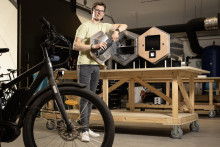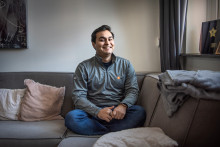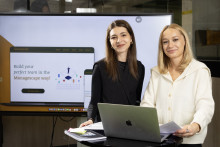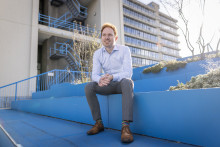The combination of engineering and entrepreneurship: Jorg Wellink (24) had been looking for that even before he started studying the Advanced Technology programme. He became fascinated by sustainability, in particular circularity and mobility. In 2019, he participated in the UT Challenge, scoring second place in the start-up category of the UT Entrepreneurial Challenge. Suddenly, he was both a student and an entrepreneur.
Fire-safe battery charging
As a consequence of that busy schedule, Wellink received a negative binding education recommendation after his first year. ‘Entrepreneurship and studying is a nearly impossible combination, especially in your first year of study,’ says Wellink. But switching to the Mechanical Engineering programme turned out to be the silver bullet. ‘Advanced Technology was a bit too wide and abstract for me. But Mechanical Engineering suited me. Turning an idea into something concrete really appealed to me.’
And so, Wellink kept perfecting his original idea; a charging station for e-bikes, which only just fell short of the main prize during the UT Challenge. VolkerWessels Telecom helped him with this by giving him tips. ‘They said: don’t focus on the energy supply side, like solar energy. There are plenty of people already working on that, you wouldn’t be able to distinguish yourself in that field.’ That is why Wellink decided to focus more specifically on safety. ‘Among the somewhat under-reported problems with e-bikes are the theft of expensive chargers and batteries and, most importantly, the fire hazard. In the Netherlands alone, there are two fires a week caused by charging e-bike batteries. This can have disastrous consequences.’
Keep moving
And so, gradually, the ChargeHyve was developed: a honeycomb-shaped locker for e-bike batteries with the fire safety of an actual safe. ‘We conducted a fire test with our prototype together with the fire brigade at Technology Base Twente. It proved resistant to temperatures of up to 1,300 degrees Celsius.’ Last summer, the first pilots with the ChargeHyve took place, at Demcon and Nederlandse Gasunie, among others. ‘It’s pretty cool that we’ve reached this point. As an entrepreneur, you're often caught up in the hustle and bustle of everyday life. As a result, you hardly ever stop to think about what you’ve already achieved.’

Because the road to such a milestone is full of crucial lessons, shares the young entrepreneur. ‘You’re never going to market your very first idea in its original form. But that idea is what makes you take the plunge. After that, you have to make pivots, alter your course and constantly adjust your idea in order to achieve success.’ An essential part of this is listening to others, says Wellink. ‘That’s also why you shouldn’t shy away from sharing your idea with others. Sometimes the feedback or criticism you receive may be hard to swallow, but it will help you strengthen your own idea.’
Time, money and talent
According to Wellink, entrepreneurship is mainly trying to get the most out of three different factors: time, money and talent. ‘There is an infinite amount of things you can do, but time is always a limiting factor.’ Acquiring funding is also no easy feat for a start-up, he continues. ‘What definitely helps in the beginning is participating in competitions. That’s how we landed the One Young World Scholarship, from Shell no less. Later, we looked at a loan - Novel-T’s TOP loan - which was the final step before focusing on investors. In our first round, we raised 310 thousand euros.’
And then there is the talent factor. The ReCycleWell team now consists of nine people. ‘Mainly students. You shouldn't expect a lot of money; we tell them so right away. But if you’re looking for challenges, flexibility and freedom, you’ve come to the right place. We have a diverse and international team and work from different perspectives on a multidisciplinary and circular product. What connects us is that we all share the enthusiasm to create something that helps society.’
‘A matter of doing it’
Wellink and his team are on the verge of a new phase. When the pilots are over, he intends to conquer the market. If it were up to him, we will soon find ChargeHyves in all kinds of businesses, hospitality venues and public spaces all over the Netherlands. ‘But we also definitely have the ambition to scale up for the European market. We’re convinced that our product solves a problem, but it’s always uncertain whether the market is ready for your product.’
What if it doesn’t work out? ‘Then I’ll try again, with a different idea. It’s just a matter of doing it; you shouldn’t let anything stand in your way. It actually took quite some time for my friends and family to change from critics to supporters. In order to reassure them, I said: In the worst case scenario, if it really doesn’t work out, I’ll have learned a lot from it.’






